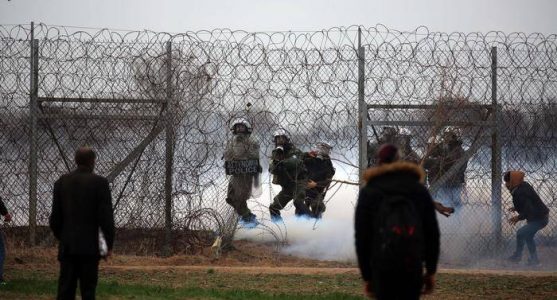
The EU strongly rejects Turkey’s use of migrants at the Greek border
The EU has advised the 12,500 migrants gathered at the Greek border that “illegal crossings will not be tolerated.” France’s top diplomat accused Ankara of “blackmail” after Turkey decided to open its borders to Europe.
At a meeting of EU interior ministers in Brussels on Wednesday, the member states said that Turkey was exploiting refugees to get its way politically.
A joint statement said that bloc “strongly rejects” the “use” of migrants by Ankara, saying that the “situation at the EU’s external borders is not acceptable.”
More than 12,500 refugees are waiting at the Turkish border to enter Greece, after Turkish President Recep Tayyip Erdogan said the borders were open last week.
“The EU and its member states remain determined to effectively protect EU’s external borders,” the ministers wrote in the statement.
“Illegal crossings will not be tolerated. In this regard, the EU and its member states will take all necessary measures, in accordance with EU and international law … Migrants should not be encouraged to endanger their lives by attempting illegal crossings by land or sea.”
The interior ministers called on Turkey to “relay this message and counter the dissemination of false information.”
Since Turkey’s decision, the humanitarian situation has deteriorated both at the land border of Greece and Turkey and on the Greek island of Lesbos.
European Council chief Charles Michel and the EU’s top diplomat Josep Borrell were in Turkey on Wednesday as political rhetoric between Ankara and Brussels heated up.
Erdogan has said he will not renegotiate a refugee deal with Europe until the bloc agrees to support its military efforts in Syria, a move French Foreign Minister Jean-Yves Le Drian called “blackmail.”
“This migratory pressure is organized,” Le Drian said in Paris. “It is organized by President Erdogan’s regime as a form of blackmail against the European Union.”
In Ankara, Borrell said that during talks the EU had offered humanitarian aid worth 60 million euros for the most vulnerable groups of people in northwestern Syria, as well as additional assistance to Turkey in addressing its own specific “challenges stemming from the situation in Syria.”
“Lives of people cannot be put at risk,” he wrote on Twitter, stressing the importance of the EU and Turkey working together.
Source: DW





